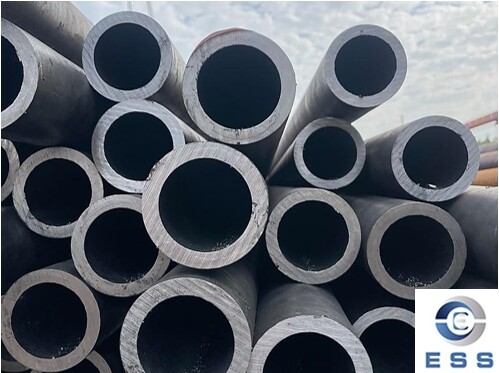
Pickled smls pipe is a seamless
steel pipe that has been specially treated.
In the production process, the basic shape of the seamless steel pipe
is first manufactured through processes such as hot rolling or cold drawing. Then, pickling
treatment is carried out, which is a key step. The pickling process usually uses
acidic solutions such as hydrochloric acid, sulfuric acid or nitric acid to
remove impurities such as oxide scale, rust, oil stains, etc. on the surface of
the steel pipe. Through pickling, the surface of the steel pipe can be bright
and clean, greatly improving the surface quality and corrosion resistance of
the steel pipe.
Types of seamless steel pipes that need pickling
In the metal processing industry, pickling is a commonly used treatment
method, mainly used to remove iron oxide scale and rust on the metal surface.
As an important industrial material, seamless steel pipes also need to be
pickled in some application scenarios. So, what kind of seamless steel pipes
need pickling?
Usually, ss smls pipe are the main
types that need to be pickled. During the production, processing,
transportation and storage of stainless steel, a layer of oxide scale or rust
is easily formed on the surface. These rust and oxides not only affect the
aesthetics of the product, but also reduce its corrosion resistance and service
life. Therefore, pickling can remove these surface contaminants and restore the
original metallic luster and performance of the stainless steel seamless pipe.
In addition, some cs seamless pipe may also need pickling under special
circumstances. For example, when there is severe rust or contaminants on the
surface of the carbon steel pipe, pickling can
help clean the surface and provide good conditions for subsequent treatments
(such as galvanizing, painting, etc.).
Material of pickled seamless pipe
As an important industrial material, the choice of material directly
determines its performance and application range. So, what is the material of
pickled seamless pipe? The materials of pickled smls pipe mainly include carbon
steel, alloy steel and stainless steel. After pickling, these materials have a
smoother surface, remove impurities and rust, and increase the service life of
the pipe:
1. Carbon steel
Carbon steel pickled seamless steel pipe is the most widely used one.
After pickling, this material of steel pipe can remove the surface oxide scale
and improve the cleanliness and corrosion resistance of the steel pipe. Carbon
steel seamless steel pipes have been widely used in pipelines in many
industries such as oil, natural gas, chemical industry, and aviation due to
their good mechanical properties and relatively low cost.
2. Alloy steel
Alloy steel pickled seamless steel pipes are rich in a variety of alloy
elements, which can significantly improve the strength, toughness and corrosion
resistance of steel pipes. Therefore, alloy steel seamless steel pipes have
advantages in situations where they need to withstand higher pressures and
harsher working environments, such as nuclear industry, aviation, aerospace,
and chemical industry.
3. Stainless steel
Stainless steel pickled seamless steel pipes mainly include austenitic
stainless steel, ferritic stainless steel, duplex stainless steel and other
materials. Stainless steel has been widely used in petrochemical industry, food
processing and other fields due to its excellent corrosion resistance. Pipeline
pickling treatment can further remove the oxide layer and impurities on the
surface of stainless steel, and improve the surface finish and corrosion
resistance of the steel pipe.
Advantages of pickled seamless pipes
1. Because of its clean surface, it can be better combined with other
materials in subsequent processing and use, such as for the manufacture of
chemical equipment, oil pipelines, etc., which can avoid corrosion and poor
sealing caused by surface impurities.
2. Good surface quality also makes it more advantageous in appearance,
and it is suitable for some occasions with high requirements for appearance.
3. After appropriate post-treatment, such as passivation, the smls pipe
after pickling can further enhance its corrosion resistance and extend its
service life.
Application of pickled seamless pipes
In the fields of petroleum, chemical, pharmaceutical, food, etc., there
are extremely high requirements for the corrosion resistance and cleanliness of
pipeline materials. These industries usually use stainless steel seamless
pipes, which are pickled to meet strict hygiene and production requirements. In
addition, in the construction of infrastructure such as urban water supply and
heating, pickled seamless pipes also play an important role, ensuring the
safety and reliability of the pipeline network.













 Eastern Steel Manufacturing Co.,Ltd not only improve product production and sales services, but also provide additional value-added services. As long as you need, we can complete your specific needs together.
Eastern Steel Manufacturing Co.,Ltd not only improve product production and sales services, but also provide additional value-added services. As long as you need, we can complete your specific needs together.










